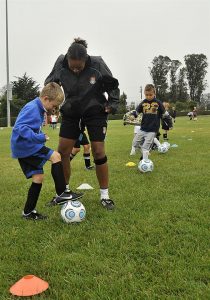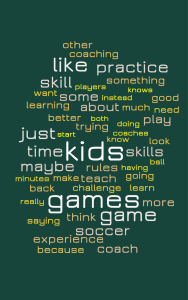Part 1 of a 2-part series
Written and edited by Andy Driska
Major contributions from Karl Erickson
A big challenge for youth sport coaches is balancing enjoyment with developing skills. Throughout my coaching career (mostly swimming and some water polo too), and now into my academic career, I was (and still am) a big advocate for building skills. Enjoyment, in my view, comes after you’ve developed some skills and can experience some success. But I wanted to debate this point with my colleague, Dr. Karl Erickson, because Karl is more on the side of enjoyment, and he knows the evidence to back up his points.
Our scenario was a coach of 7-10 year-old soccer players with a 45-minute practice. The question for debate was how we should use those 45 minutes – should we prioritize skill development, or player enjoyment?
We recorded our debate, which quickly turned into more of a conversation that lasted for an hour. What follows is a loose transcript of our debate. We don’t have all the answers, but our goal was to make this “food for thought” for coaches and coach educators. Enjoy!

Andy Driska, Ph.D.
Andy Driska (for skills): So let’s just assume this is a utopia where we are coaching soccer for kids 7-10 years old and we don’t have a pressure to win at all costs. Instead, it’s all about making it a “great experience” for the kids. I say making a great experience is all about putting skills first… how to dribble and pass, give-and-gos, corner kicks, rules of the game. I want players to see from the beginning to the end of the season, they have gotten better.
But I have a feeling you’re going to say that it’s all about making sure the kids have a good experience, that they keep coming back, that practice is something that they look forward to during the week, where they develop some friendships. You might say that they don’t care so much about how good they get, but instead that they are having a good time.
So, if you’re a coach with a 45-minute practice session, how do you use your time? Do you develop their soccer skills? Or devote that time to activities that make sure the kids will enjoy their time and have fun and leave satisfied with soccer?

Karl Erickson, Ph.D.
Karl Erickson (for enjoyment): I come down on the “fun” side, especially for the younger kids. They’ve gotta enjoy it and come back. What’s the point of a really good soccer player that doesn’t play soccer? That’s a fundamental rule for coaches at that age, to make sure they enjoy soccer and want to come back.
When they get to the age when they can develop some real skills and do some real training, you want them to be willing to be there and see the point and the benefits of practice. I’m not saying that skill doesn’t matter, but if I had to pick one of the two, I’m coming down on the side of fun, enjoyment, motivation, connection with the game. If you do that, you can get the other stuff later, but without the love of the game, none of the other stuff matters.
Andy Driska: I agree that fun matters. Fun and skills… those are my top priorities coaching this age, no doubt. Winning is not as important, it’s tough to control. I lean on the skill side and it probably starts with my own personal experience. I had fun getting better at something. I won several Most Improved Player awards… it was a running a joke with my high school teammates! But when I look back at my coaching experience, most of the athletes I coached liked getting better too, and they liked being challenged. If I challenged a kid and they get better, it may not look like “fun” but it keeps them coming back. And you said that’s important, right?
Karl Erickson: Yeah, it’s not like we’re saying enjoyment is important and skill development doesn’t matter. But it’s kind of like you’re saying, “if you had to pick one that would lead downstream to the other, which one would you prioritize?”
I totally get what you’re saying, that mastering challenges could be fun. I just worry that it could be a slippery slope. You misread a kid, and all of a sudden, a challenge is more like punishing them with drudgery. I think we have to be careful that prioritizing skill and challenge, we could make it not enjoyable.
I’m thinking from the flip-side… what if we prioritize fun with the idea that it might have some effects on the players’ skill? In soccer, what’s the most fun? Touching the ball, scoring goals, trying something crazy with the ball. There’s a good chance the more you do that, you’re going to learn some stuff about soccer. What if I just engineer my practices to give kids more opportunities like that, instead of standing in lines and trying to learn some tactical formation?
Kids soak up stuff from the environment all the time. We don’t teach kids how to speak, we just talk around them, and put them in scenarios where talking happens, and they pick up speech.
Andy Driska: So are you saying that maybe we can trick kids into learning soccer skills with fun games? Or you might even be saying that skills don’t matter yet for 7-10 year-olds?
Karl Erickson: A little bit of both. If we’re intentional about our practices, we can “trick” kids into learning skills while they’re having fun, but at lower risk. Even if they don’t learn skills but they’re still having fun, I think that’s a win, and they can pick up the skills a little later. If we do it the other way around and prioritize skills and hope they have fun doing that, but we miss the boat and they don’t have fun, they might not come back next year and then we’ve lost them for good.
Andy Driska: I see what you’re saying, but what if you have a kid that doesn’t think playing games is a good use of time? They think that if they’re playing a game and adults are supervising, it doesn’t make sense, because their whole world is supervised by adults who are pushing them and corralling them to do certain things. If we have soccer practice that’s more like supervised recess, this kid might be thinking, “I should be practicing my corner kicks right now.”
Maybe they get this impression from their parents or older siblings, and they think, “I’m signed up for soccer, but I’m not learning anything, I’m not getting any better. We just play. What am I paying for?”

Is direct coaching of skills expected during a structured soccer practice?
Karl Erickson: Well, just because kids are accustomed to all of this structure, do we have to play into that system as coaches? Or do we pause to ask ourselves, “do we want to keep perpetuating that experience for a kid, where their life is structured and driven by adults’ needs and desires?”
I’m not saying that all coaching of kids under 10 should be “just roll the ball out and let them play.” But what if we actually worked with the kids to get something out of play scenarios? Instead, we try to build some intrinsic appreciation of the game, rather than building a skill that the adults will notice. We find out what the kids want from the game, rather than another a spoon-fed lesson, or another line of cones.
I wonder, do kids go after challenges to increase their performance and become better at the sport? Or is that a game, just to see if you can do it… just because! The coach knows in the back of their mind that a challenge might lead to some skill improvement, but does the kid need to know that? Can the kid just exist in the moment, where that’s just a fun challenge, to see if they can do it?
Andy Driska: I look at your point through my childhood experience of being a swimming pool rat. There were many dares and challenges that we gave to each other, like, “I bet you can’t swim from here to there without taking a breath.” They were the natural dare games that kids play.
But to me, the minute you start selling a kid on “this challenge will help you be a better athlete,” then you’re already starting to take some of the fun out of it. I mean, if the kid is like, “wow, I can do something that I couldn’t do before,” then that, to me, is the end-goal. As the coach, you know in the back of your head that this challenge will make the player a better athlete, but more importantly it will give them an enhanced sense of confidence, and sometimes it can give them standing with their peers, like, “did you see what she can do?”
I feel you need some of those skill elements and challenges in a practice, but talk about how they are fun and challenging now, in the moment, and not how they will make you a better athlete in the future.
Karl Erickson: Okay, so is our debate about the way that we adults are framing our practices? Rather than deciding to do something fun that doesn’t develop skill, or to do this skill practice that is absolutely zero fun, instead we do something that could be perceived either way by the kids? Is that the conversation we’re having? Or are there situations where you have decide between skill development or enjoyment?
Andy Driska: There’s definitely evidence out there that says we learn better in situations where we’re having… I don’t want to say fun, because in the moment, we wouldn’t think it was fun… it’s more like total challenge, exertion… I’m stretched to my max. I’m using all my capabilities and I’m completely engaged. Maybe engaged is the word, or a flow experience.
Karl Erickson: Call it a flow experience, or maybe it’s intrinsic motivation. Is the big idea behind the ideal practice that you are doing it because you want to, not because someone else is making you do it?
And maybe, when we look at this in the big picture of child development, these kinds of experiences are really important at age 7. When you’re older, in high school, you have the cognitive capacity to look further into the future and understand that an unpleasant practice you dislike might benefit you in the long run.
But for kids, who don’t really have the capacity to consider long-term goals, you’re more focused on the moment. Your inclination is to engage with activities that are rewarding in the moment. One kid might perceive an activity as “fun,” while another kid might perceive the activity as developing their skills or getting better at something.

Andy Driska: So maybe a goal for coaches of this age group is engaging activities that are interesting in their own right. And in an era where, for whatever reason we’ve taken away fun, “dangerous” play from children, maybe that’s what practices have become. We’re paying to have an adult, a coach, recreate safer versions of the wilder play experiences and pick-up games that we had when we were kids.
Karl Erickson: Yeah! A really, really resource-intensive way of getting something that could happen naturally!
Andy Driska: Yeah! I mean, this is the equivalent of climbing trees, which was a really fun thing for me as a kid, but I don’t see a lot of kids doing that any more.
Karl Erickson: So then you have to wonder, how much do we have to structure those experiences, because of the nature of society? Maybe the organized sport setting becomes bounded, designed versions of those free-play experiences we had as kids, where fun is the goal but skill development and challenge will come along with it.
One experience that really clarified that for me was an experience I had coaching rugby for 7-year-olds. We thought if we could teach kids 2-on-1 situations, they’d understand rugby tactics. We spent the better part of a season on that, but didn’t get very far. Later that year, we ran a clinic for 12-14 year-olds, and we covered the 2-on-1 in ten minutes. They understood it right away and could put it into games.
So to me, the idea that we have to get skills early or they’re going to be left behind, is that correct? Don’t we have time to let them just try stuff out a little bit and not worry about the specific skills they’re getting, because catching up is much more possible than we realize?
If I had kept coaching those 7-year-olds and spent all that time teaching 2-on-1, I would have run them out of the sport. I would have wasted my time and their time.
Andy Driska: I think that’s a great point. I’m thinking about the way we teach skills, where we try to pull a skill out of a larger game strategy. We do part-whole instruction. That might be the way to teach math, but it’s not a great way to teach sports or movement. The minute you start breaking skills down too much, you start putting too much structure into it. And from what we know from skill acquisition and motor learning, that’s not a great way to teach skill. But it looks structured, and coaches who run practices like that are respected because they are running a structured practice instead of supervised play-time… even though the athletes might not be learning better because of the added structure.
I think part of it is that we need to listen to the people who say we should get away from the dominant way of teaching skills, of trying to teach a 2-on-1, an abstract concept, to an 8-year-old. You’re wasting you’re time. But, to everyone else (like parents), it looks like you’re trying to teach them, so it has the appearance of teaching or coaching, but in reality there’s no learning occurring.
If you look at schools, they’re trying to make classroom learning more like games and sports. They want to game-ify everything. And in sports, we already have games! We have what school teachers wish they had! And what are we trying to do? We’re trying to turn it into classroom learning! Learn your letters, then your words, then start putting words together… but that’s not how kids learn to play soccer. Like you said earlier, kids learn to talk by being around people talking.
If you’re planning a practice though, you’ve still got to put a plan down on paper. How do you plan this chaotic… enjoyable… challenging… engaging… “fun stuff” that you talk about?
To be continued!
In Part 2, we will debate what practice could look like, what coaches can learn from children’s games, and discuss a simple strategy for breaking up practice to make planning easier and practices more engaging and productive.
Andy Driska is an Assistant Professor in the Department of Kinesiology. He coordinates the graduate programs in sport coaching and leadership and teaches courses in sport psychology, skill acquisition, and coaching science. He conducts research on coach education and athlete development.
Karl Erickson is an Assistant Professor in the Department of Kinesiology. He teaches courses in sport psychology and sport sociology, and conducts research that focuses on understanding youth sport as a context for personal development.
Both Dr. Driska and Dr. Erickson are affiliated with the Institute for the Study of Youth Sports and will be participating in the upcoming 40th Anniversary Conference this Nov 29 – Dec 1.




